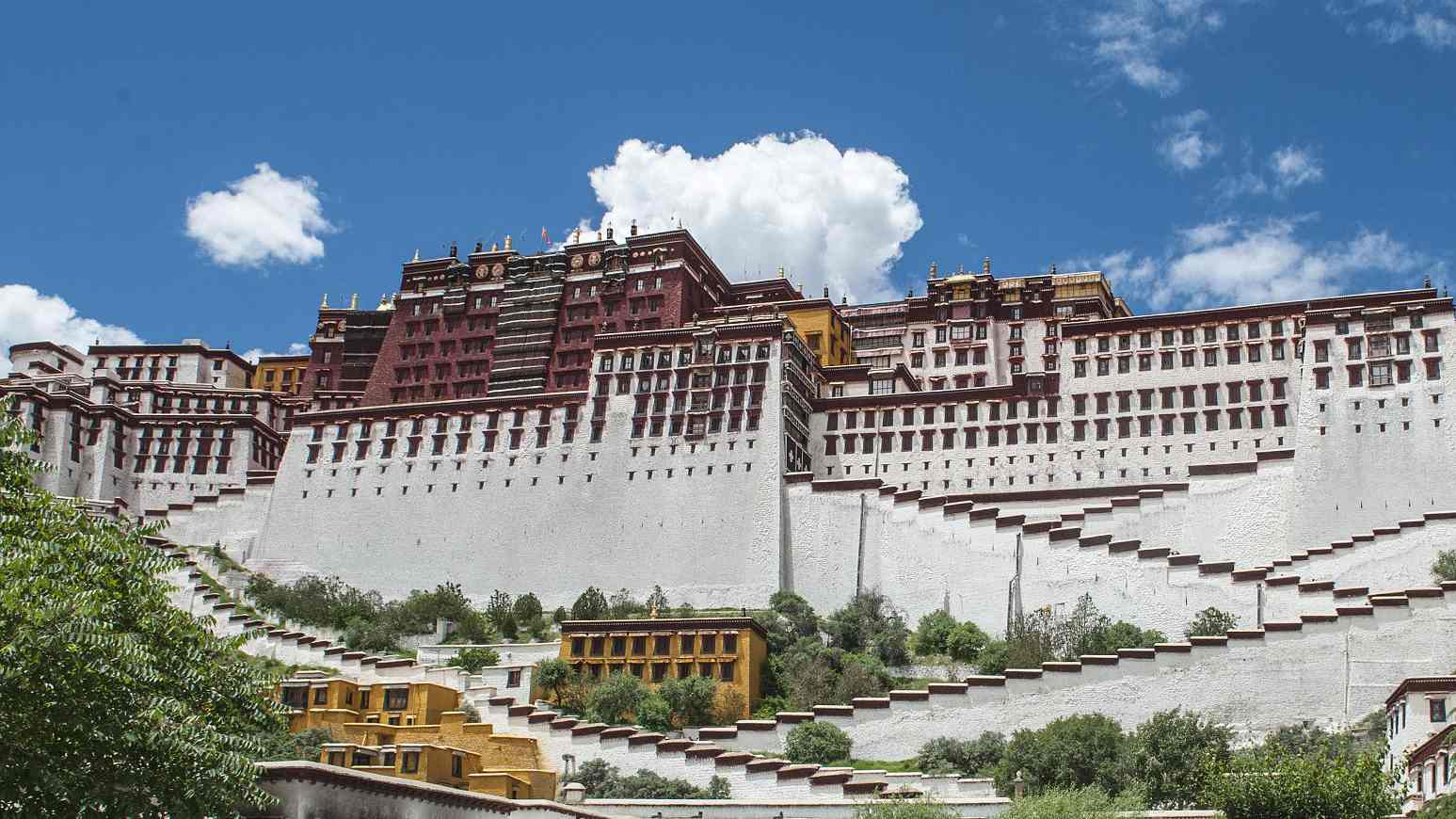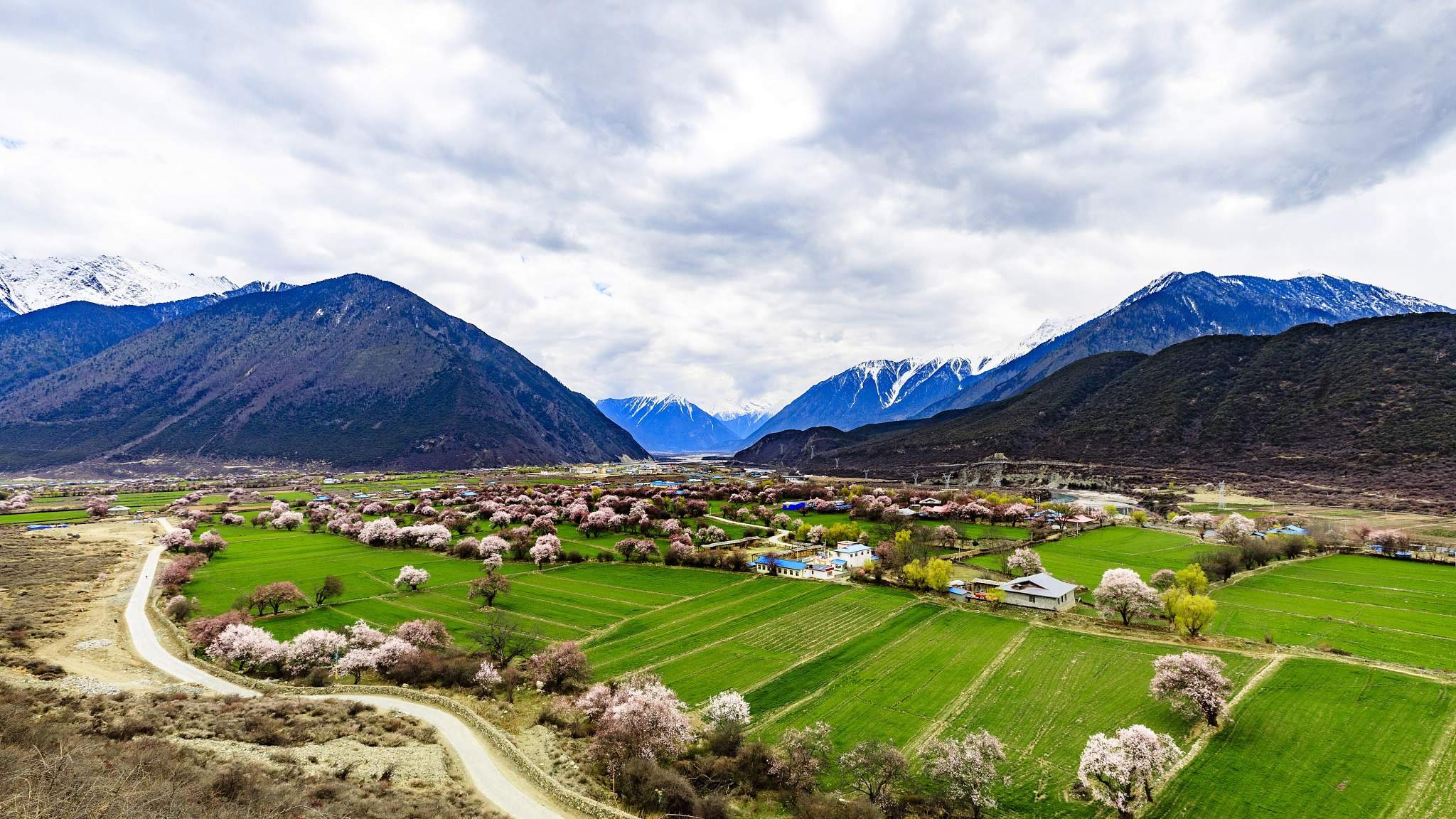
The Potala Palace, Lhasa, Tibet. /VCG Photo
The Potala Palace, Lhasa, Tibet. /VCG Photo
Editor's note: Lu Xia is an associate professor at the School of Marxism Studies and a research fellow at the National Academy of Development & Strategies, Renmin University of China. The article reflects the author's opinions and not necessarily the views of CGTN.
Chinese President Xi Jinping, also general secretary of the Communist Party of China (CPC) Central Committee, made a three-day inspection tour of Tibet Autonomous Region, a place full of resources and potential for further development.
During the inspection, President Xi stressed fully implementing the Party's strategy for governing Tibet in a new era and making new progress in terms of lasting stability and high-quality development for this western border mountainous plateau region.
It was President Xi's first local visit right after the CPC held the celebration gathering for the 100th anniversary of its founding earlier this month. The timing of the visit has clearly shown its significant meaning and the leadership's concern with the region.
Seventy years ago, less than two years after the founding of the People's Republic of China (PRC) and the establishment of its legitimate authority across the country, Tibet obtained peaceful liberation and started its socio-economic transformation under the management of the central government.
Previously, the central authority had always sent a delegation to the anniversary celebration, normally headed by the vice-president. But this time, President Xi, as the country's top leader, visited Tibet for the 70th anniversary of Tibet's peaceful liberation by himself, which is the first time in the history of the CPC and the PRC.
Besides extending congratulations, President Xi also visited officials and ordinary people of various ethnic groups and conveyed the Party's care to them. It's reasonable to argue that with the CPC's strong and firm leadership of the past 70 years, Tibet has made historic strides in the social system and has realized full economic and social development, with people's living standards significantly improved.
Development is the hard truth and the basis for solving all the problems in Tibet. With the reform and opening-up process of the country, the level of social productivity development in Tibet has gradually kept pace with the whole country, and the people of all ethnic groups in Tibet have been enjoying increasingly rich achievements of modern civilization.
With the strong support of the central government and the people of the whole country, the Tibetan people have worked together to build the poor and backward old Tibet into a new Tibet with economic and cultural prosperity, overall social progress, a sound ecological environment and happy life for themselves.
To meet that goal, the high-quality economic and social development of Tibet is in need of acceleration, and among all the work, the most important and urgent task is to consolidate the achievements of poverty alleviation.

Nyingchi in southwest China's Tibet Autonomous Region, March 25, 2018. /VCG Photo
Nyingchi in southwest China's Tibet Autonomous Region, March 25, 2018. /VCG Photo
In 2019, with the 70th anniversary of the founding of the PRC, Tibet fulfilled the task of the basic eradication of absolute poverty throughout the region, illustrating the significance and far-reaching impact of this great event. However, as Tibet's economic and industrial bases are relatively weak, there is a greater risk of returning to poverty, which may influence national unity. Therefore, to consolidate stability and security, Tibet needs to have high standards of socio-economic integration.
In addition to development, President Xi also pointed out that protecting the ecology of the Qinghai-Tibet Plateau is the greatest contribution to the survival and development of China. Tibet is located in the hinterland of the Qinghai-Tibet Plateau and is an important ecological safety barrier.
It might be the last retreat point if the Chinese nation and civilization were to face unpredictable natural challenges in the future. Therefore, the ecological protection in this region must be prioritized and the concept of "mountains and rivers green are mountains of silver and gold" must be adhered to.
The Chinese central authority is enacting its responsibility to history, to the people, and to the world by creating an ecological civilization with a more prominent position and developing the Qinghai-Tibet Plateau into a national and even international ecological civilization highland.
Therefore, high-quality ecological development calls for further promotion of the scientific investigation of the Qinghai-Tibet Plateau, revealing the mechanism of environmental change, accurately grasping the impact of global climate change and human activities on the Qinghai-Tibet Plateau, and studying and proposing systematic plans and engineering measures for protection, repair and governance.
In order to balance the development and preservation, the central authority should improve the compensation method, promote the combination of ecological protection and improving people's livelihood, better mobilize all aspects of enthusiasm, and form a virtuous cycle mechanism to build a good ecology and share a better life.
Xi's inspection tour to Tibet is by no means a mere routine local visit. Rather, it signals the strategy and principle of governing Tibet in the new era. It includes firm principles like adhering to the strong leadership of the CPC, the socialist system with Chinese characteristics, the system of regional ethnic autonomy as well as long-term strategic ideas.
(If you want to contribute and have specific expertise, please contact us at opinions@cgtn.com.)

